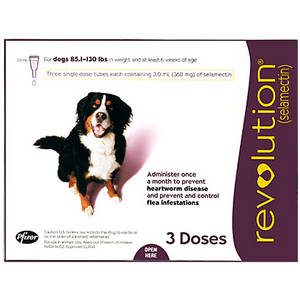Selamectin in Revolution for Dogs

Heartworm is a potentially deadly disease where parasitic worms of the species Dirofilaria immitis inhabit the heart and associated blood vessels. Luckily, it is easily preventable with monthly tablets, chews or topical liquids.
The ingredients most commonly used to prevent heartworm are from a group of chemicals called macrocyclic lactones (MLs). One of the more common is called selamectin, found in Revolution. Selamectin is derived from a sugar produced by a soil bacterium called Streptomyces avermitilis.1
Selamectin, like all of the MLs, works at different dose rates and methods of application for different parasites. In the topical preparation used for heartworm prevention in dogs, the dose used is effective against heartworm larvae, fleas, ear mites, sarcoptic mites and the American Dog Tick. In cats, it is effective against heartworm larvae, fleas, roundworms, hookworms and ear mites.2
Selamectin works by interfering with the parasite's nerve transmission, causing a flaccid (floppy) paralysis and subsequent death.1
|
"[Selamectin] is effective against heartworm larvae, fleas, ear mites, sarcoptic mites and the American Dog
Tick. In cats, it is effective against heartworm larvae, fleas, roundworms, hookworms and ear mites."
|
The label states that Revolution is not effective in killing mature adult worms in the dog's heart, nor microfilari, the offspring produced by adult worms in the heart.2 However, dogs should be tested prior to commencing this or any other heartworm preventative medication, as they can have a mild allergic reaction if they have a heartworm infection when the preventative is started.
All ML products have very wide safety margins for mammals, with adverse reactions uncommon. Allergic reactions to the drug bases are more likely than reactions to the toxicity of the drugs themselves when used as recommended. Occasionally, your pet's skin may react to Revolution, including hair loss and itching, at the site of application.

Some breeding lines of Collies display increased sensitivity to the drug as they don't have a particular protein carrier in their blood-brain barrier which regulates the entry of MLs, so the drugs can move freely into the brain and cause nervous problems.
In very young animals the blood-brain barrier is not completely closed, so the drug can enter freely and cause nervous symptoms. This is one reason that selamectin-based products are not recommended for newborn pups or kittens. However they can be given safely from six weeks of age in pups and eight weeks in kittens.
|
Selamectin toxicity symptoms
|
| The signs seen with Selamectin toxicity include:
�
|
At the doses used for heartworm prevention, it is unlikely that any of these symptoms will occur, but if you do notice any of them, contact your veterinarian immediately.
Prevention is definitely better than cure in the case of heartworm. Make sure that your dog is on preventative medication throughout the heartworm transmission season. This may mean year-round treatment in some parts of the country. Consult your veterinarian for further advice and to discuss an appropriate treatment for your dog.
�
�
�
�
|
References
|
| 1.Vercruysse J, Rew RS (2003). Macrocyclic Lactones in Antiparasitic Therapy. CABI
Publishing. Ivermectin toxicosis. American Board of Veterinary Toxicology. http://www.abvt.org Information: Revolution?. Pfizer Animal Health . 2.Product 3.Ivermectin toxicosis. American Board of Veterinary Toxicology. http://www.abvt.org � Also:American Heartworm Society. http://www.heartwormsociety.org/heart.htm |
Revolution� is a Pfizer registered trademark.
�